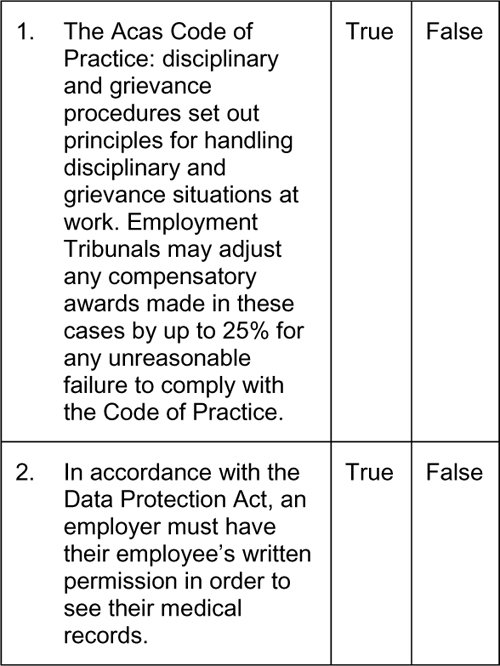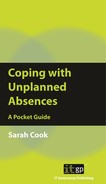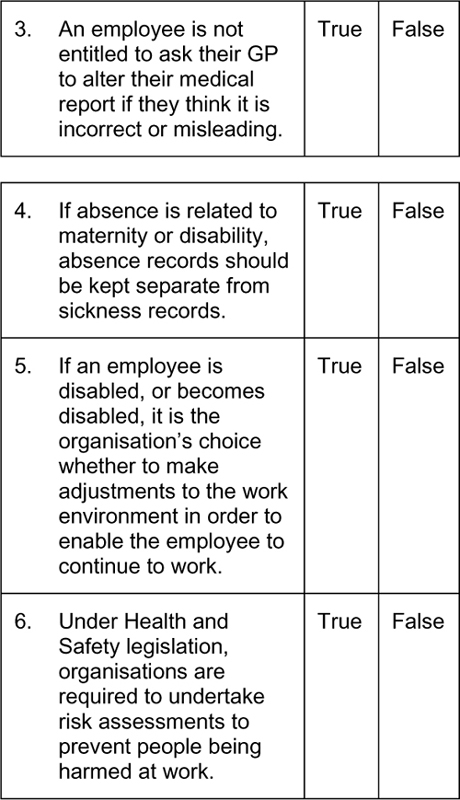CHAPTER 2: PRACTICAL STEPS AND
LEGAL ASPECTS
This chapter looks at what practical actions you can take if members of staff have unplanned absences. It also looks at the legal aspects of unplanned absence which, as a manager, you will need to be aware of and comply with.
A member of your team is unexpectedly absent
Imagine that you have a team member who is unexpectedly absent. This is an unauthorised absence1 and the employee is not already self certified as sick, nor do they have a Fit Note2.
By law, in the UK employees are entitled to 28 days’ holiday. This includes provision for the eight permanent bank and public holidays in the UK. However, employees have no statutory right to take their holidays on public holidays. This again is dependent on their contract of employment.
In addition, by law there are a number of circumstances when an employer is obliged to provide special leave, such as court service, maternity and paternity leave, personal and domestic leave. Employees also have statutory rights to request flexible forms of working and to request time off for training.
There is no legal requirement to give employees time off to attend medical or dental appointments. It is recommended that you consult your organisation’s policy documents to see what conditions apply to your employees. Some organisations expect employees to take unpaid leave, others may want them to make up the time or use annual leave.
Contact the team member
Normally, an employee should notify you within an hour of their normal start time of their absence. Check your organisation’s absence management policy to see what practices apply to your business.
If the employee has not contacted you (or the nominated representative in line with your organisation’s policy), best practice is for you to contact them. Studies have shown that the sooner you make contact with the person who is absent, and stay in contact with them, the sooner they will return to work. Be considerate, empathetic and non-intrusive. Ask them how they are and what you can do to help.
Make provisions to cover their work
When you speak to the employee, where possible ask them to update you about the status of their work. In the following chapters, guidance is provided on how best to cover the work of people whose absence is unauthorised.
Stay in regular contact
You can encourage speedy return and goodwill by staying in regular contact with absent employees. It is important that you do this sensitively and that you agree a contact plan with the employee, rather than impose your views. In some instances you may also need to agree the contact plan not only with the employee, but also with their trade union or employee representative. Depending on the agreement and the reason given for the unplanned absence, a phone call or e-mail shows you are concerned and allows the employee to keep you updated without being intrusive.
Short-term sickness is the most common form of absence and it is estimated that 80% of unplanned absence has this at its heart. This covers minor ailments, such as colds, back pain, migraines, etc.
If it turns out that the employee is absent with long-term sickness, you may need to consider making adjustments to the working environment so they can return to work. This could include a change of working hours, modified job role or accommodating the employee’s mobility. If the employee is on long-term sick, you will also need to discuss their sick pay. Again, take HR advice on this aspect.
Disciplinary action
If unplanned absenteeism becomes a repeated problem, it is essential that you discuss the issue in an informal manner with the team member and agree an improvement plan. If this fails, and you have exhausted all other informal routes, you may decide to take disciplinary action.
The arbitration service Acas has set out principles for handling disciplinary action at work. These include:
• informing the employee of the problem;
• holding a meeting to discuss the problem;
• allowing the employee to be accompanied at the meeting;
• deciding on appropriate action;
• providing the opportunity for the employee to appeal.
If you do decide to take this approach, ensure that you are familiar with your organisation’s disciplinary and grievance procedure and that you are supported by a HR professional.
Staying within the law
There are a number of laws which protect the employee when it comes to matters of absenteeism. Taking HR advice is vital to ensure that you stay within the law.
How well do you know the law?
Look at each of the following scenarios and decide which are true and false. (You will find the answers on page 26.)
Table 3: How well do you know the law?
Which of the following statements are true or false?

1. True
2. True
3. False
4. True
5. False
6. True
1 Authorised absences, such as holidays, need to be agreed in accordance with the terms of the individual’s contract of employment.
2 If an employee is absent and they return to work within seven days, then they will need to complete a self certificate form. This is a document that asks them to briefly explain why they were absent. A ‘Fit Note’ or properly entitled, a ‘Statement of Fitness for Work’, is a note from a GP that the employee needs to present to you if they are absent for seven days or more. The GP sets out in the note whether the employee is unfit for work or may be fit for work in certain circumstances.

